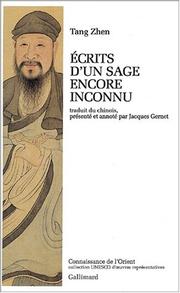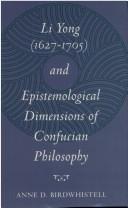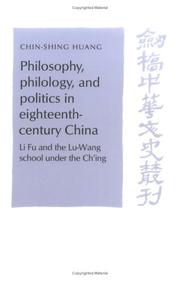| Listing 1 - 10 of 16 | << page >> |
Sort by
|
Book
ISBN: 9571501174 9571501166 Year: 1991 Publisher: 臺北 臺灣學生書局
Abstract | Keywords | Export | Availability | Bookmark
 Loading...
Loading...Choose an application
- Reference Manager
- EndNote
- RefWorks (Direct export to RefWorks)
Book
ISBN: 0300213336 9780300213331 9780300191578 030019157X Year: 2015 Publisher: New Haven Yale University Press
Abstract | Keywords | Export | Availability | Bookmark
 Loading...
Loading...Choose an application
- Reference Manager
- EndNote
- RefWorks (Direct export to RefWorks)
This book, the first English translation of what many consider to be the most original work of Chinese philosophy produced in the twentieth century, draws from Buddhist and Confucian philosophy to develop a critical inquiry into the relation between the ontological and the phenomenal. This annotated edition examines Xiong Shili's complex engagement with Buddhist thought and the legacy of Xiong's thought in New Confucian philosophy. It will be an indispensable resource for students of Eastern philosophy and Chinese intellectual history, as well as for philosophers who may not be familiar with the Chinese tradition.
Knowledge, Theory of. --- Epistemology --- Theory of knowledge --- Philosophy --- Psychology --- S12/0217 --- S12/0240 --- China: Philosophy and Classics--Epistemology --- China: Philosophy and Classics--Chinese philosophy: Qing
Book
ISBN: 0415582083 0203849213 9780415582087 9780203849217 Year: 2010 Publisher: London Routledge
Abstract | Keywords | Export | Availability | Bookmark
 Loading...
Loading...Choose an application
- Reference Manager
- EndNote
- RefWorks (Direct export to RefWorks)
Kang, Youwei, --- Zhang, Taiyan, --- China --- Intellectual life --- S12/0240 --- S04/0750 --- China: Philosophy and Classics--Chinese philosophy: Qing --- China: History--Reform movement: 1898 and 1900 - 1911 --- Kang, Youwei --- kang, you wei --- 康有為 --- 康有为
Book
ISBN: 9789866923142 9866923142 Year: 2007 Publisher: 臺北 里仁書局
Abstract | Keywords | Export | Availability | Bookmark
 Loading...
Loading...Choose an application
- Reference Manager
- EndNote
- RefWorks (Direct export to RefWorks)

ISBN: 2070724409 9782070724406 Year: 1991 Volume: vol 73 Publisher: Paris : Gallimard,
Abstract | Keywords | Export | Availability | Bookmark
 Loading...
Loading...Choose an application
- Reference Manager
- EndNote
- RefWorks (Direct export to RefWorks)
Book
ISBN: 9789004434448 9004434445 9004434712 9789004434714 Year: 2020 Publisher: Leiden Brill
Abstract | Keywords | Export | Availability | Bookmark
 Loading...
Loading...Choose an application
- Reference Manager
- EndNote
- RefWorks (Direct export to RefWorks)
"In Confucian Concord, Federico Brusadelli offers an intellectual analysis of the Datong Shu. Written by Kang Youwei (1858-1927) and conceived as his most esoteric and comprehensive legacy to posterity, the book was eventually published only posthumously, in 1935, being "too advanced for the times" in the author's own opinion. Connecting the book to the author's intellectual biography and framing it within the intellectual and political debate of the time, Brusadelli investigates the conceptual and philosophical implications of Kang's 'global prophecy', showing how an apparently 'utopian' and 'escapist' piece of literature was actually an attempt to save (at least ideally) the imperial political order, updating the traditional Confucian universalism to a new, 'modern' world"--
Utopias --- Universalism --- Confucianism --- Kang, Youwei, --- 康有为, --- Kʻang, Yu-wei, --- Religions --- Salus extra ecclesiam --- Universal salvation --- Salvation --- Salvation after death --- Ideal states --- States, Ideal --- Utopian literature --- Political science --- Socialism --- Voyages, Imaginary --- Dystopias --- Christianity --- S06/0255 --- S12/0240 --- China: Politics and government--Political theory: modern (and/or under Western influence) --- China: Philosophy and Classics--Chinese philosophy: Qing --- Confucianism. --- Universalism. --- Utopias. --- Da tong shu (Kang, Youwei).
Book
Abstract | Keywords | Export | Availability | Bookmark
 Loading...
Loading...Choose an application
- Reference Manager
- EndNote
- RefWorks (Direct export to RefWorks)
S02/0215 --- S12/0240 --- S12/0400 --- S12/0450 --- China: General works--Intellectuals: 1840 -1949 --- China: Philosophy and Classics--Chinese philosophy: Qing --- China: Philosophy and Classics--Kongzi 孔子 Confucius and Confucianism --- China: Philosophy and Classics--Ming, Qing: later Confucian teachings, Sacred Edicts (incl. Wang Fuzhi, Yan Yuan, Li Kong, Dai Dongyuan)
Book
ISBN: 9629969165 9789629969165 9789629964979 Year: 2013 Publisher: Hong Kong The Chinese University Press
Abstract | Keywords | Export | Availability | Bookmark
 Loading...
Loading...Choose an application
- Reference Manager
- EndNote
- RefWorks (Direct export to RefWorks)
This volume first explores the transformation of Chinese Daoism in late imperial period through the writings of prominent literati scholars of the period. In such a cultural context it then launches an in-depth investigation into the Daoist dimensions of the Chinese narrative masterpiece, The Story of the Stone: the inscriptions of Quanzhen Daoism in the infrastructure of its religious framework, the ideological ramifications of the Daoist concepts of chaos, purity, and the natural, as well as the Daoist images of the gourd, fish, and bird. The author demonstrates in an insightful manner the central position of Daoist philosophy both in the ideological structure of the Stone and the literati culture that spawns it.
Taoism in literature. --- Taoism --- History. --- Cao, Xueqin, --- S16/0419 --- S12/0500 --- S12/0240 --- China: Literature and theatrical art--Traditional novels: Qing: studies, texts and translations --- China: Philosophy and Classics--Laozi and Taoism (incl. Daodejing) --- China: Philosophy and Classics--Chinese philosophy: Qing --- Tsʻao, Hsüeh-chʻin,

ISBN: 0804726051 9780804726054 Year: 1996 Publisher: Stanford (Calif.): Stanford university press
Abstract | Keywords | Export | Availability | Bookmark
 Loading...
Loading...Choose an application
- Reference Manager
- EndNote
- RefWorks (Direct export to RefWorks)
Knowledge, Theory of --- Confucianism --- Li, Yong, --- S12/0400 --- S12/0240 --- Epistemology --- Theory of knowledge --- Philosophy --- Psychology --- Religions --- China: Philosophy and Classics--Kongzi 孔子 Confucius and Confucianism --- China: Philosophy and Classics--Chinese philosophy: Qing --- Li, Yung --- Yong, Li --- 李庸 --- 李勇 --- 李永 --- 李湧 --- Confucianism. --- Knowledge, Theory of. --- Li, Yung, --- 李顒, --- 李[Yong], --- Li, Erqu, --- Li, Erh-chʻü, --- 李二曲, --- Li, Rong, --- Li, Jung, --- 李容, --- Li, Zhongfu, --- 李中孚, --- Erquxiansheng, --- 二曲先生, --- Erqutushibingfu, --- 二曲土室病夫, --- Li, Yong, - 1627-1705

ISBN: 0521482259 0521529468 0511529112 Year: 1996 Publisher: Cambridge Cambridge University press
Abstract | Keywords | Export | Availability | Bookmark
 Loading...
Loading...Choose an application
- Reference Manager
- EndNote
- RefWorks (Direct export to RefWorks)
This book explains the general intellectual climate of the early Ch'ing period, and the political and cultural characteristics of the Ch'ing regime at the time. Professor Huang brings to life the book's central characters, Li Fu and the three great emperors - K'ang-hsi, Yung-cheng, and Chien-lung - whom he served. Although the author's main concern is to explain the contributions of Li Fu to the Lu-Wang school of Confucianism, he also gives a clearly written account of the Lu-Wang and Ch'eng-Chu schools from the twelfth century to the eighteenth. In a clear, succinct style, Huang explains the historical differences between the Ch'eng-Chu and Lu-Wang schools without sacrificing the subtleties of either. The book culminates in a discussion of the hero-emperor K'ang-hsi's appropriation of the 'Tradition of the Way' from his intellectual officials, which denied them their traditional role as moral censors and critics of the emperor's exercise of authority.
Philosophy, Chinese --- Neo-Confucianism. --- Political science --- Philosophie chinoise --- Néo-confucianisme --- Science politique --- Philosophy. --- Philosophie --- Li, Fu, --- China --- Chine --- Intellectual life --- Vie intellectuelle --- S12/0215 --- S12/0450 --- -Neo-Confucianism --- China: Philosophy and Classics--Philosophy of language --- China: Philosophy and Classics--Ming, Qing: later Confucian teachings, Sacred Edicts (incl. Wang Fuzhi, Yan Yuan, Li Kong, Dai Dongyuan) --- Li, Fu --- S12/0240 --- S12/0216 --- -Confucianism --- Administration --- Civil government --- Commonwealth, The --- Government --- Political theory --- Political thought --- Politics --- Science, Political --- Social sciences --- State, The --- Chinese philosophy --- China: Philosophy and Classics--Chinese philosophy: Qing --- China: Philosophy and Classics--Political philosophy --- Philosophy --- 李复 --- 李孚 --- 李富 --- 李復 --- 李甫 --- 犁夫 --- -Administration --- Confucianism --- Arts and Humanities --- History --- -Philosophy
| Listing 1 - 10 of 16 | << page >> |
Sort by
|

 Search
Search Feedback
Feedback About UniCat
About UniCat  Help
Help News
News